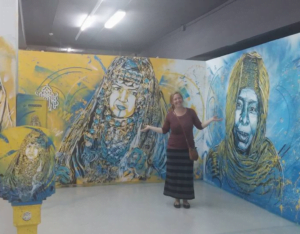A Review of Saba Mahmoud’s Feminist Theory, Embodiment, and the Docile Agent: Some Reflections on the Egyptian Islamic Revival
We’ve all seen and heard the idea that Islam is contrary to feminism. How they’re incompatible. But what about groups of females that look towards Islam to reclaim their power and agency? Can they be viewed as feminists as well? Mahmoud explores this subject deeper in the above-referenced article, focusing on women’s agency and growth through exploring Islam.
Summary
This essay changed my perspective on life. In short, Mahmoud uses a women’s mosque movement in Egypt as a case study to redefine agency and freedom outside of Western standards. In Mahmoud’s own words:
In order to analyze the participation of women in religious movements, such as the Egyptian mosque movement I describe, I want to suggest we think of agency not as a synonym for resistance to relations of domination, but as a capacity for action that historically specific relations of subordination en- able and create.
Mahmoud, 203
Definition of Agency
Mahmoud says that agency is the product of operations of power, rather than aspects of the self that existed before the operations—therefore, it is impossible to separate agency from one’s environment. Rather than viewing agency through the lens of subverting norms (rebelling against the status quo), she argues that agency is often secured through the very same conditions that have made the subject subordinate; the subject uses the same means of subordination to create a self-conscious identity.
Essentially, we use what has historically oppressed us to gain some form of agency.
Agency Within the Egyptian Women’s Mosque Movement
Mahmoud uses the Egyptian women’s mosque movement as an example that agency can be cultivated through norms that are by and large viewed as subversive. The movement is a growing group of Egyptian women that hold meetings in mosques to read the Koran and discuss Islamic doctrine. Although taking up this space within a religion that is historically oppressive to women is progressive in its own way, it is also paradoxical: Islam upholds the belief that women should be submissive and subordinate to men.
Westerners tend to write off women’s movements that are seen as “anti-feminist” or “backwards,” citing that these movements are rooted in the internalized oppression of patriarchal norms. But Mahmoud explains that cultivating norms such as shyness and docility was another way of creating agency for these women. Within the Muslim society, al-haya (shyness/modesty) is a desire that is stressed for women, unlike in Western society. And although at first difficult and perhaps an unnatural feeling, eventually women’s outward actions of shyness synchronize with their inward thoughts, solidifying their agency. The hijab, a controversial topic now, is part of this method of cultivating shyness:
For the women I worked with, the veil is not a matter of “civilizational choice…” …it is first and foremost a command from God. Neither does its importance lie in the symbolic meaning it carries as a marker of the Muslim/Arab identity (like the Indian sari). In fact, women mosque participants would often argue that those who don the veil for its symbolic significance have a deeply flawed understanding of the Islamic injunction, one veils not to express an identity but as a necessary, if insufficient, condition for attaining the goal internal to that practice—namely, the creation of a shy and modest self. The veil in this sense is the means both of being and becoming a certain kind of a person…
Mahmoud, 215
The Takeaway
First and foremost, we can’t impose our own beliefs and norms on different cultures. Each culture has been exposed to different experiences, pressures, oppressions and so on. All of this information uniquely shapes us into who we are, and determines how we find our power through our own agency. As Mahmoud says:
My argument simply is that in order for us to be able to judge, in a morally and politically informed way, even those practices we consider objectionable, it is important to take into consideration the desires, motivations, commitments, and aspirations of the people to whom these practices are important. Thus, in order to explore the kinds of injury specific to women located in par- ticular historical and cultural situations, it is not enough simply to point, for example, that a tradition of female piety or modesty serves to give legitimacy to women’s subordination. Rather it is only by exploring these traditions in relation to the practical engagements and forms of life in which they are embedded that we can come to understand the significance of that subordination to the women who embody it.
Mahmoud, 225
In Conclusion
Agency, rather than being discovered within someone, is shaped largely by external factors. Mahmoud was a scholar, not a politician. Her role was to observe, analyze and record. She did not write this article to argue specifics on how agency should be, but rather how it came to be within this group of women. Too often we rush into believing that women, particularly within Islam, are being forced to do such things as to wear a hijab. Before doing so, let’s listen and learn how these women have figured out how to shape their agency within a religion that has historically oppressed them.
Liked this post? Pin it!


Subscribe to receive Snook Outta Water’s monthly newsletter with exclusive updates and content.

Leave a Reply